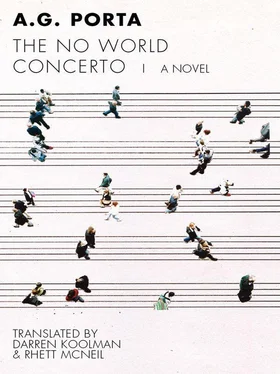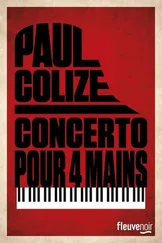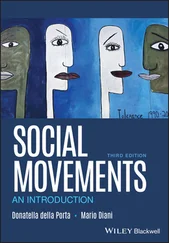A. Porta - No World Concerto
Здесь есть возможность читать онлайн «A. Porta - No World Concerto» весь текст электронной книги совершенно бесплатно (целиком полную версию без сокращений). В некоторых случаях можно слушать аудио, скачать через торрент в формате fb2 и присутствует краткое содержание. Год выпуска: 2013, Издательство: Dalkey Archive Press, Жанр: Современная проза, на английском языке. Описание произведения, (предисловие) а так же отзывы посетителей доступны на портале библиотеки ЛибКат.
- Название:No World Concerto
- Автор:
- Издательство:Dalkey Archive Press
- Жанр:
- Год:2013
- ISBN:нет данных
- Рейтинг книги:4 / 5. Голосов: 1
-
Избранное:Добавить в избранное
- Отзывы:
-
Ваша оценка:
- 80
- 1
- 2
- 3
- 4
- 5
No World Concerto: краткое содержание, описание и аннотация
Предлагаем к чтению аннотацию, описание, краткое содержание или предисловие (зависит от того, что написал сам автор книги «No World Concerto»). Если вы не нашли необходимую информацию о книге — напишите в комментариях, мы постараемся отыскать её.
, Vila-Matas's
, and Marías's
is a many-layered puzzle concerning an old screenwriter who has holed up in a shabby hotel in a never-named but familiar city in order to write a script about his lover — a young piano prodigy who wants in turn to give up music and become a novelist, and who believes she may be in contact with creatures from another world. Ambition, lust, hate, and the need to create all combine to make up a potent depiction of youth — and age — lost in a labyrinth of their own making.
Sinister and erotic, shifting restlessly between realities, and populated by conspirators both real and imagined,
is an investigation of the limits of language, storytelling, and the known world, set against a backdrop of empty concert halls and hazy foosball bars. It is the first of A. G. Porta's books to appear in English, finally joining those of his early writing partner and devotee Roberto Bolaño.
No World Concerto — читать онлайн бесплатно полную книгу (весь текст) целиком
Ниже представлен текст книги, разбитый по страницам. Система сохранения места последней прочитанной страницы, позволяет с удобством читать онлайн бесплатно книгу «No World Concerto», без необходимости каждый раз заново искать на чём Вы остановились. Поставьте закладку, и сможете в любой момент перейти на страницу, на которой закончили чтение.
Интервал:
Закладка:
As for the recording, the specially prepared piano, and achieving that impossible sound, they can all go to hell. She hasn’t the remotest chance of rising above the standard of her age with a magisterial interpretation of the 5 Pieces for piano . It would’ve been the ideal music for future cities in space too. It’s best to just forget about it. But how can she abandon such an ambitious project at a time like this? What if this decision, as her decision to quit music for writing, is also due to her being under hypnosis? She’d find she was living a delusion, that her life was a total lie. She’d be just a fraud. She searches in her satchel for the work of the writer who revolutionized twentieth-century literature, and tries reading some passages. But then she decides perhaps it isn’t the time to engage with a work that will require all her powers of concentration. She would’ve liked to exorcise those spirits that keep whispering she was hypnotized, that tell her there’s a conspiracy involving her parents, the scientist, and Cousin McGregor, but not even the writer who revolutionized literature can take her mind off these things, so she closes the book and puts it back in her satchel. If she isn’t able to write, the waiting is going to be horrendous. She doesn’t know how he does it — sitting alone in his hotel room, waiting for one of the phones to ring, or for the fax machine to kick in, or for something to happen in the Grand Central Station. She wishes she’d taken her bags with her when she left her father’s hotel. She feels like she’s wasting time, but she supposes time’s relative when it comes to writing. Now the hours seem to drag, and every hour feels like four — four wasted hours, since she’s not working on her novel. She wonders if a change of location would help. But she’s so close to witnessing one of the most important events in the history of our species. She can’t leave the city yet. She’s been writing about the old professor, but she’s hasn’t fully explored the alien hunter side of his character yet, or the survivor of the great war that devastated the City in Outer Space, but she can’t think of anything to write, and the little she manages to produce does nothing to galvanize her. She seems to have lost that strength, that confidence, which helped her overcome so many obstacles in her life. She seems, instead, to have become insecure, doubtful of her talent and her literary vocation. Fuck the brilliant composer, she says. She needs to go for a walk. She can’t spend her life locked inside her own head, circling around the same thoughts. It’s a sure way of transforming them into obsessions. Is she going mad? If so, it must be because she lives the life of a hermit, hiding away, waiting for something to happen — she doesn’t know what, perhaps nothing, perhaps a call from her father to give her instructions, to tell her something, anything to dispel her uncertainty. Maybe it was too soon to give up on her idea about the cathedrals and churches. Perhaps the reason no one responded to her ad in the paper is that she didn’t know how to formulate the message correctly. She takes the gun from the back of her pants. She has a lot to think about, and she’s sick of doing laps in the room. The streets give her much more space to stretch her legs, although she knows there’s no guarantee of the same for her mind.
He goes through every pocket twice. It’s no use. He doesn’t have another penny to his name. The prospect’s been looming for days now but he’s been simply ignoring it. He doesn’t even have enough to get a croissant. It’s not a good day for the screenwriter, who’s been scouring half-deserted streets where most of the stores are closed, as if it were a Sunday, looking for an affordable place to eat. He decides to go back to the hotel and have breakfast. It’s not only more expensive than the café on the plaza, but the waitress is hideous. At least the bill’s charged to his account, though, which relieves some pressure, and gives him time to consider his options. He eats in silence, thinking. He won’t be able to buy a newspaper today. He wonders if he’s nearing the end of the road. Never in his life did he imagine he’d be in such dire straits. He still receives a small pension every month, but it’s ridiculously small. If that was his only source of income, he’d die of starvation. He’ll probably get a bigger pension when he fully retires. But then he thinks he’ll probably never fully retire, that he’ll more than likely croak at his writing desk. Die with his boots on, so to speak. It’s too soon to be thinking about this; too early in the day for feeling sorry for oneself. With a coffee in hand, he takes out his notebook and comes up with a list of people he could petition for help. Then he performs a simple calculation that lays out his current financial situation: the second advance from the producer will barely cover his debts. He’ll call again. Then he thinks about calling his own son. No, not him. Maybe the girl will lend him some cash.
The producer’s not answering. So he’s back on the street, sitting on a bench, thinking about who he should turn to. He laughs at the image that pops in his head — an image of himself, dressed in rags, sitting in a damp street corner soliciting alms. He laughs because he’s unable to cry. He’s never been in such a desperate situation. He gets up and makes his way slowly back to the hotel. He thinks he’d survive without one of his jackets. That’s a good idea. And why not dispense with a couple of shirts as well? There’s also a pair of shoes he doesn’t need, a pair of trousers, and why does he need two suitcases?
He feels humiliated in front of the saleswoman. He’d have preferred to find the store closed, like so many other businesses on the day celebrating the neighboring capital’s liberation. He’d have preferred to burn the clothes than be insulted with such a paltry offer. But he knows he needs the money, so he tries haggling over a few cents’ difference before agreeing to the deal. Come on, it’s only a few cents, he says. The offer’s nonnegotiable, the saleswoman says. He has no choice but to accept. He takes the cash from her hands, trying his best to hold back the tears, and makes a promise to himself that he’ll buy all his stuff back as soon as possible. He fantasizes about buying a new wardrobe once the advance arrives. Then again, he doesn’t ever want to see his old shirts and jacket on the backs of strangers. No, he’ll buy them back as soon as possible. Back on the street, he thinks of an old movie in which someone says you can get away with being broke when you’re young, but never when you’re old.
Later that night, at the hotel in front of the Grand Central Station, the girl’s father still hasn’t gotten back, and she’s sitting beside the telephone, waiting for a call. She doesn’t know from whom, although she doesn’t expect the brilliant composer to call again. He was drunk as usual when he called earlier, so the girl, likewise as usual, cut the conversation short. She doesn’t want to hear about him, the young conductor, or any of that riffraff. She doesn’t care. As usual, she’s sitting in her room doing nothing. She certainly can’t write. Should she just wait around until something happens? She gets up and starts pacing up and down, growing angrier with every pace. Then she strikes the walls, again and again, before closing her eyes and gritting her teeth to hold back the tears. They’re not going to make me cry, she says to herself, before repeating it again and again. Idiot, idiot, idiot! she cries. Once again, she’s allowed herself to be made a fool of. To be made ridiculous. She feels like a laughingstock. She calls herself a stupid bitch for taking so long to wake up, to snap out of her fantasy, like a drunk who’s finally sobered up after amusing everyone with her antics the previous night. Now they’re all laughing at her. No, her mother just thinks she’s crazy, and as for her father: well, he doesn’t give a damn. But then there are those fuckers. She won’t let them depress her. Maybe she should say goodbye to her father before going back to her native city. The girl wonders where he could be. She doesn’t think there’ll be any trains arriving at this hour. She presumes that neither her father nor Cousin McGregor is in the station. She wonders what would happen to the voices she hears if the aliens were to finally appear. She’d probably lose her connection with them. They’ve already been communicating with her for a few years now — perhaps long enough. She walks up and down the hotel room, shaking her head, gesturing nervously, with her hands in and out of her pockets. She can’t seem to make a decision. Her stomach’s completely empty, and it’s starting to ache with all its churning, but she notes that the pain itself is killing her appetite. Like the pain of a wounded ego, she says. She’s thinking about waiting for her father to get back so she can tell him she’s going home. That she just can’t take it anymore. He didn’t tell her what time he’ll be back, but she doesn’t think it’ll be too late. She leaves a note on his bed and goes out to a nearby restaurant. Although she’s not hungry, she decides she must put something in her stomach. The night could be a long one, and she won’t be able to stand the constant churning. She picks up a newspaper and flips to the ads section. Still there: “I hear voices. 1. The No World is all that is the case. Ka.” Perhaps she’s made a mistake, and that’s why she hasn’t received an answer. Not that it matters to her now. Now she’s finally given up hope of ever making contact. She never thought her obsession with finding out whether or not she was hypnotized would affect her so much. Now, instead of aliens, she’s going in search of some elusive hypnotist. She reads that the coach of her favorite soccer team has fined the star player for his overlong vacation. She smiles, but it’s soon cut short when she stumbles across a picture of the scientist in the classically-cut suit. Before she reads a single word, she knows he’s dead, as if she can augur the contents of the article merely by looking at the photo, the layout of the page, the type, or something. She’s surprised he was found dead in a hotel. The astrophysicist had apparently been living there for the past few years. The newspaper says nothing more about it, so the girl reads the article again and again, while eating, without relish, what she can of her meal. They could have at least given the name of the hotel. She goes back up to her father’s room. Perhaps this is what’s been keeping her father away from his post in the station. The girl feels a little despondent over the news. She’d been expecting it for some time, but now that it’s happened, she’s still taken aback. She feels as if something’s suddenly changed, that nothing will be the same from this moment on. She’ll wait for her father to get back so she can say good-bye, then she’s going back home to try living her own life. She’s mad at her mother for having colluded with her ex-colleagues. Shouldn’t she just group them all together and refer to them collectively as enemies? If it weren’t for them, she’d have completed her cycle of concerts and done the recording by now. What does the young conductor know about performing the 5 Pieces for piano anyway? Neither he nor her mother seem to understand that her disposition inclines her more toward performing in a recording studio, where certain effects can be produced and experimented with, and where subtle nuances can be captured on tape, which an audience in a concert hall couldn’t possibly register as they would when listening to the recording. When it comes to the business of wounding her pride, her mother’s as dispassionate as a corporate executive. She’d put a lot of stock in the girl one day becoming a great pianist, and she’s determined to see a return on her investment. But the girl ended up taking a different path. Besides, she’s not a commodity to be traded on the market. She has ideas of her own. What did her mother expect? She didn’t even know where to draw the line between parent and manager. And her father hasn’t exactly been a model parent either. So when it comes to choosing between them, her dilemma is more a case of picking the better of two evils. There’s still the screenwriter, she thinks. But the screenwriter’s just an innocent, unwitting participant in this cruel and perverse game. Perhaps she hasn’t been very honest with people generally. If something goes wrong, it’s part of the game, she repeats. She’s said it so many times it’s become like a mantra. Perhaps looking to blame others for wrongs done to oneself is also part of the game. How are the others playing the game? Is it she, or is it everyone else that’s not playing the way they should? She sits in a chair and makes a note of all the ways she plans to reproach her parents, then repeats them aloud to herself, as if rehearsing for a performance. She sets the first scene in the hotel room she’s sitting in now, where she’ll bid her father farewell by first incriminating him for his cold indifference, his unfeeling aloofness toward his own daughter. You damn egoist, she’ll say on marching out the door, after packing her bags in front of him. Then she’ll go to the hotel with the English name to spend the night, but only for the opportunity of haranguing her mother as well. Then she’ll get up early in the morning to begin her journey back home. Of course, she may only be a piano starlet because of mother’s connections. So she supposes it’s possible she’s only a commodity after all. Outside, fireworks are exploding to mark the fiftieth anniversary of the city’s liberation. Her mother could be a special guest at the fireworks display. The girl’s always seen her mother as an executive of sorts, but there’s nothing to say she isn’t a high-class hooker, rubbing shoulders with the rich and powerful. The girl is still waiting, and beginning to think it’s a pointless vigil, because her father hasn’t even called. She forces herself to stay awake, even going so far as to hold her eyelids open, as children do, when she feels them beginning to droop. She forces herself to stay annoyed at him, finds that rehearsing her reproaches against him help to keep her frown intact. She knows that if she falls asleep her anger will have diffused by morning, and she won’t have enough fire left in her belly to really read him the riot act for all his years of neglect. But she also knows that if she falls asleep the voices will be there waiting for her on the other side, waiting in that world that overtakes us when we sleep, a world to which we all go to make our dreams a reality, and our realities a dream. When the girl eventually falls asleep, she dreams her reality is a game; that her father and Cousin McGregor are playing a game she doesn’t understand; that her mother is sitting on a throne in a palace somewhere seeing everything unfolding before her. Then the Queen speaks. She says the whole world functions as a game, that the young conductor and brilliant composer aren’t alone in understanding it as such. The girl pinches her arm to check if it’s real, and awakens. She sees that it’s dawn and that her father still hasn’t gotten back. Her arm hurts like hell. She sits up to contemplate the surrounding gloom. She does what she always does when she wakes up, except this time she’s fully clothed. She can never get any rest when she sleeps in her clothes. She gets up and goes to the mirror. She looks like shit, she thinks, and then notices the small bruise on her arm. First she goes to the balcony to wait, observing the traffic in front of the Grand Central Station. Then she goes back inside to continue her vigil in bed, staring at the ceiling, counting the minutes as they pass, her eyes opening and closing, sleep threatening to overtake her again until she gets up and splashes some cold water on her face, because this time she’s determined to stay awake. She puts on some music, sits down with her diary, and writes that she dreamed everything was just a game. After she’s done writing, she puts her earphones back on the nightstand and turns toward the balcony — toward the noise of the traffic outside, feeling reassured the world is once again on the march. After a shower and change of clothes and another futile attempt to continue her novel, she decides to just pack her bags and not wait for her father to return. She wanted him to see her pack her bags. It would’ve made her exit more theatrical. But she needed something to do, something to relieve all the tension. She’s not as angry as she was the night before, but she still has something in her belly that will singe his hair, so she decides to wait a little longer. Before long, though, she’s back in bed asleep, tossing and turning, the very picture of someone having a nightmare. The last one she had was about her mother conspiring with her father and Cousin McGregor to have her locked up in an institution. It’s the only way to snap her out of her hypnotic trance, they said.
Читать дальшеИнтервал:
Закладка:
Похожие книги на «No World Concerto»
Представляем Вашему вниманию похожие книги на «No World Concerto» списком для выбора. Мы отобрали схожую по названию и смыслу литературу в надежде предоставить читателям больше вариантов отыскать новые, интересные, ещё непрочитанные произведения.
Обсуждение, отзывы о книге «No World Concerto» и просто собственные мнения читателей. Оставьте ваши комментарии, напишите, что Вы думаете о произведении, его смысле или главных героях. Укажите что конкретно понравилось, а что нет, и почему Вы так считаете.












